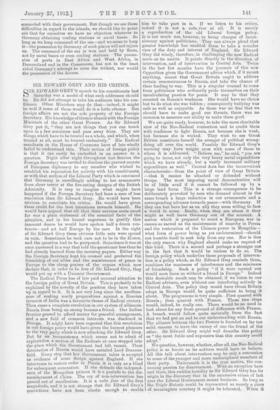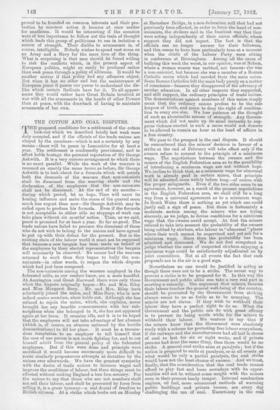SIR EDWARD GREY AND HIS CRITICS.
SIR EDWARD GREY'S speech to his constituents last Saturday was a model of what such addressee should be. He did not attempt to take his audience into his con- fidence. Other Ministers may do that—indeed, it might be well if some of them would do it a little oftener. But foreign affairs are not the sole property of the Foreign Secretary. His knowledge of them is shared with the Foreign Ministers of the other Great Powers. As Sir Edward Grey put it, "they are not things that you can touch upon in a few sentences and pass away from. They are things which have to be treated as a whole, and which, when treated at all, must be treated exclusively." His Radical assailants in the House of Commons have of late wholly failed to understand this. Their notion of foreign policy is that it can easily be embodied in an answer to a question. Night after night throughout last Session the Foreign Secretary was invited to disclose the graved secrets of European diplomacy to any member who wished to establish his reputation for activity with his constituents, or with that section of the Liberal Party which is convinced that Germany is unwillingly adding to her armaments from sheer terror at the fire-eating designs of the British Admiralty. It is easy to imagine what might have happened if the Foreign Secretary had been a man of less resolution than Sir Edward Grey. He would have been anxious to conciliate his critics. He would have given them credit for the best intentions towards himself. He would have argued that all that their nervous souls eared for was a plain statement of the essential facts of the situation, and in his honest eagerness to gratify this innocent desire he would have spoken half a dozen sen- tences—and set half Europe by the ears In the sight of Sir Edward Grey these obvious little nets were spread in vain. Sometimes he took care not to be in the House, and the question had to be postponed. Sometimes it Was at once answered in a way that told the questioner less than he had already learned from the morning papers. Either way the Foreign Secretary kept his counsel and preferred the friendship of our allies and the maintenance of peace in Europe to the cheap praises of the organs which now declare that, in order to be free of Sir Edward Grey, they would put up with a Unionist Government, The Radical Press has of late paid unusual attention to the foreign policy of Great Britain. This is probably to be explained by the novelty of the position they have taken up in regard to it. It is not very long since the needless- ness of making costly preparations against a Russian invasion of India was a favourite theme of Radical oratory. Then came a complete revolution in our system of alliances. Russia from being an enemy became a friend. Our Indian frontier proved to afford matter for peaceful arrangement, and a new field of common interests was disclosed in Europe. It might have been expected that this revolution in our foreign policy would have given the keenest pleasure to the very party which is now attacking Sir Edward Grey. But by an inconsistency which seems not to admit of explanation a section of the Radicals at once stopped into the place which the Government had left vacant. Their detestation of Russia would have satisfied Lord Beacons- field. Every step that her Government takes is accepted as evidence of some design against England. If she intervenes to restore order in Persia it is only as a. blind for subsequent annexation. If shedefends the independ- ence of the Mongolian princes it is a prelude to the dis- memberment of China. The cry of non-iutervention has passed out of recollection. It is a volte face of the first magnitude, and it is not strange that Sir Edward Grey's convictions have not been elastic enough to enable him to take part in it. If we listen to his critics, indeed it is not a volts /ace at all. It is merely a reproduction of the old Liberal foreign policy. It is not much use, however, to bring charges of incon- sistency against politicians. They can always plead that greater knowledge has enabled them to take a sounder view of the duty and interest of England. Sir Edward Grey did wisely, therefore, in challenging the new Radical move on its merits. It points directly in the direction of intervention, and of intervention in Central Asia. Twice in the last few months have the journals of this new Opposition given the Government advice which, if it meant anything, meant that Great Britain ought to address certain remonstrances to Russia, and take the chance of their leading to war. This is a singular counsel to come from politicians who ordinarily pride themselves on their uncalculating passion for peace. It may be that they counted on Russia's weakness. She would have no choice but to do what she was bidden ; consequently bullying was safe as well as enjoyable. As there was no fear that we should have to make good our threats, there was no occasion to measure our ability to make them good.
We are quite ready, however, to take the more charitable view of the Noo-Radical contention and to credit them with readiness to fight Russia, not because she is weak, but because she is wicked. They wish to see Great Britain constitute herself the avenger of political wrong- doing all over the world. Possibly Sir Edward Grey's warning may have weight even with some of those to whom it is addressed. "Believe me," he said, "you are going to incur, not only the very heavy naval expenditure which we have already, but a vastly increased military expenditure as well." Central Asia has the inconvenient characteristic—from the point of view of Great Britain —that it cannot be attacked or defended without troops. The most imposing naval demonstration will be of little avail if it cannot be followed up by a large land force. This is a strange consequence to be deliberately provoked by men who demand almost in the same breath a large reduction in our armaments and a corresponding advance towards peace—with Germany. If they can but have her as an ally they seem willing to face a world in arms. Really, when they are about it they might as well leave Germany out of the account. A nation which is prepared to court a European war in causes so sacred as the maintenance of anarchy in Persia and the restoration of the Chinese power in Mongolia—. what form of power being as yet undetermined—should not humble itself to seek help from any one. Nor is this the only reason why England should make no request of this kind. There is a second and perhaps a stronger one in the fact that it would be useless to do so. The foreign policy which underlies these proposals of interven- tion is a policy which, as Sir Edward Grey reminds them, combines the mazintwrn of interference and the minimum of friendship. Such a policy "if it were carried out would soon leave us without a friend in Europe." Indeed this desirable result may be obtained, if we listen to our Radical advisers, even without our interfering actively in Central Asia. The policy they would have Great Britain adopt in Europe would be quite sufficient to bring it about. The programme is very simple. First quarrel with Russia ; then quarrel with France. These two steps would, indeed, be really one. There would be no need to look about for any fresh ground of difference with France. A breach would follow quite naturally from the fact that we had put an end to our understanding with Russia. The alliance between the two Powers is founded on far too solid reasons to leave the enemy of one the friend of the other. Sir Edward Grey might well describe this policy as"the most futile and expensive that this country could adopt." We question, however, whether, after all, the Neo-Radica.1 policy is as heroic as its authors would have us believe. All this talk about intervention may be only a concession to some of the younger and more undisciplined members of their party. Underneath it is the true motive, the con- suming passion for disarmament. With an exception here and there, this sudden hostility to Sir Edward Grey has its origin in the discovery that in the successive crises of last year the Liberal Government meant business. So long as the Triple Entente could be represented as merely a piece of meaningless courtesy it might be tolerated. When it proved to be founded on common interests and their pro- tection by common action it became at once matter for anathema. It would be interesting if the occasion were of less importance to follow out the train of thought which leads this group of politicians to see in isolation a source of strength. Their dislike to armaments is, of course, intelligible. Nobody wishes to spend vast sums on an Army and a Navy for the mere love of the thing. What is surprising is that men should be found willing to risk the conflicts which, in the present aspect of European politics, might so easily be produced rather than seek peace through a policy of alliances. It would be another matter if that policy had any offensive object. But when it has no other end but the maintenance of European peace it passes our power to understand the dis- like which certain Radicals have for it. To all appear- ances they would rather have Great Britain involved at war with all the armaments in the hands of other Powers than at peace, with the drawback of having to maintain armaments of her own.























































 Previous page
Previous page